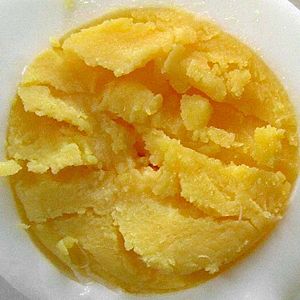Cookbook:Hard Cooked Eggs
Appearance
| Hard Cooked Eggs | |
|---|---|
  | |
| Category | Egg recipes |
| Difficulty | |
Cookbook | Recipes | Ingredients | Equipment | Techniques | Cookbook Disambiguation Pages | Recipes | Breakfast
Hard-boiled or hard-cooked eggs are a preparation where whole eggs are cooked in the shell until both the yolk and the white are fully cooked. After cooking, the shell is typically cracked all over and removed.
Ingredients
[edit | edit source]Procedure
[edit | edit source]Boiling method
[edit | edit source]- Put the eggs in a pot.
- Fill pot with water. Make sure that the tops of the eggs are covered by at least 25 mm (1 inch).
- Bring to a rolling boil.
- Reduce heat to a low boil. Cook for 10–15 minutes, depending on the size and number of eggs.
- Drain the pot.
- Cool eggs immediately by running cold water over them or putting in ice water.
- Crack and peel the eggs under very cold running water, starting by cracking the large (air pocket) end, then taking off the largest pieces first.
Steaming method
[edit | edit source]Hard cooked eggs can be steamed rather than boiled. There are automatic kitchen appliances for steaming eggs, but it can be done with any kind of steamer.
- Put about 2 cm of water in a pot and bring to a fast boil.
- Put steamer basket in pot (no water should be in the basket itself—only under).
- Put eggs in basket.
- Place lid on pot. Steam for about 12–13 minutes—the heat can be lowered slightly, as long as there is steam.
- Cool eggs in iced water.
- Crack and peel eggs as above.
Notes, tips, and variations
[edit | edit source]- Older eggs will be easier to peel, as the air space is larger.
- If the peeling becomes tragic, you can always make egg salad or bird food!
- Lowering the eggs' temperature and/or adding salt to the water keeps the shells from sticking, and prevents the greenish tinge sometimes seen on hard-boiled eggs. The greenish tinge doesn't affect taste or safety, and does not indicate decay or toxicity. Instead, it is due to the reaction between iron and sulphur from the egg white and yolk.
- An alternate method for boiling is to turn off the heat after adding the eggs, cover the pot, and let stand 15–18 minutes.
- Salt in the boiling water can help keep egg white from seeping out of a crack.
- Multiple layers of eggs in the pot are more likely to crack: use only a single layer and do another batch.
- Some people find steamed eggs easier to peel than boiled.
Warnings
[edit | edit source]- Boiled or washed eggs will only keep about a week-the protective cover over the shell is gone.
- Hard-boiled eggs left out too long should not be eaten. For example, Easter eggs should not be eaten unless the contents of the egg are blown out and cooked separately.
